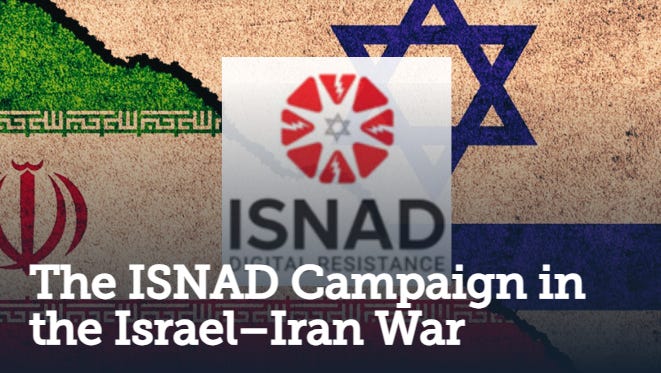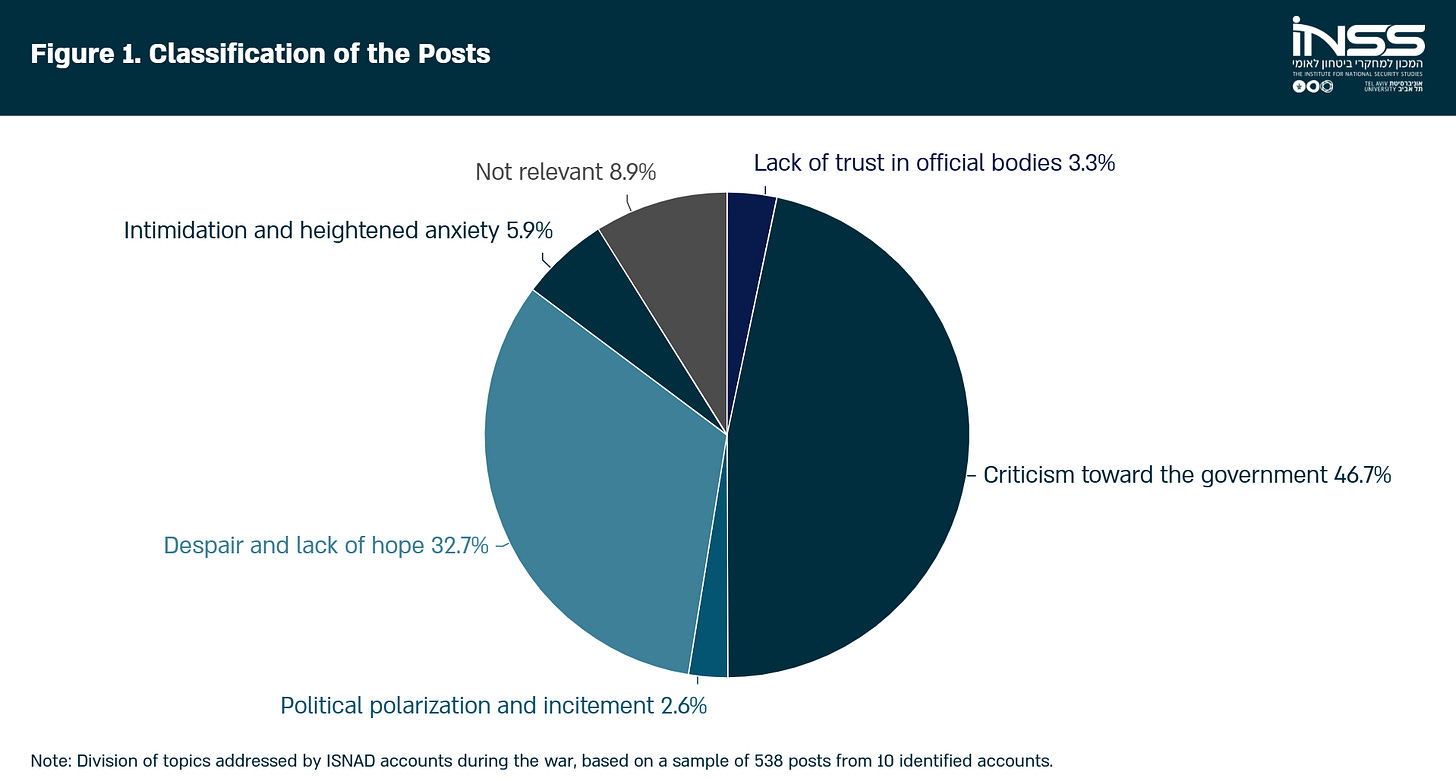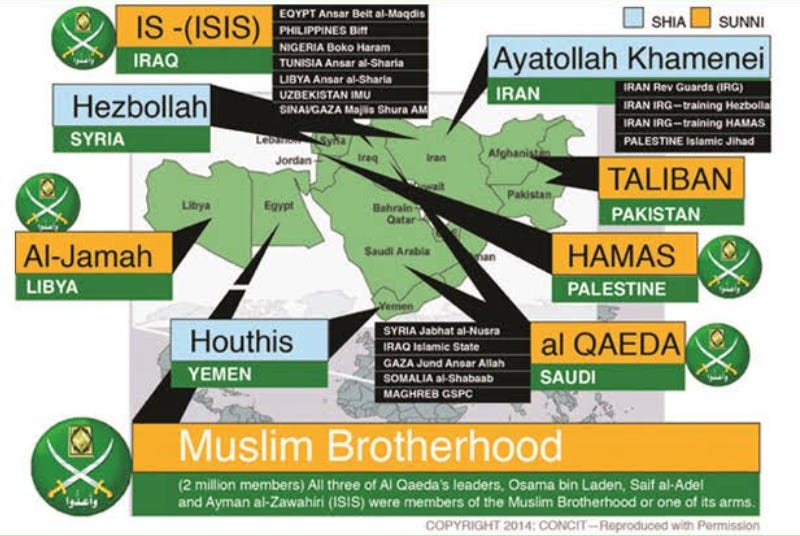Muslim Brotherhood-Tied Group Masqueraded as Israelis to Wage Psychological War: Report
New Institute for National Security Studies report reveals sophisticated foreign influence operation that exploited Hebrew-speaking imposters to fracture Israeli society during wartime

In the shadowy realm of modern information warfare, a sophisticated campaign has emerged that represents a new frontier in foreign interference operations. The ISNAD (Islamic Information Network in Support of Palestinian Resistance) campaign, detailed in a comprehensive new report by Israel's Institute for National Security Studies (INSS), demonstrates how hostile actors can weaponize digital identity to infiltrate and manipulate democratic societies from within.
The campaign, launched in December 2023 by Azeddine Dawidar, a former Egyptian opposition activist in exile and supporter of the Muslim Brotherhood, presents itself as an "independent, grassroots volunteer movement." However, beneath this benign facade lies what security experts describe as one of the most sophisticated Foreign Information Manipulation and Interference (FIMI) operations ever documented.
The Architecture of Deception
What sets ISNAD apart from conventional disinformation campaigns is its sophisticated impersonation strategy. Rather than simply spreading propaganda from foreign accounts, the operation deploys thousands of volunteers operating fake Israeli social media profiles complete with Hebrew names, authentic-looking biographies, and credible profile pictures. These digital imposters present themselves as genuine Israelis, making their messages appear as organic internal criticism of the Israeli government and society.
"The dominant component of the ISNAD campaign is the impersonation of Israelis, which makes the messages appear as if they originate from Israelis themselves," the INSS report reveals. To overcome linguistic barriers, the campaign employs a sophisticated distribution system using Telegram bots that provide ready-made responses in Hebrew, along with Arabic translations for volunteer activists primarily based in Turkey and Egypt.
The operation represents what the report’s author, Lt. Col. (res.) David Siman-Tov, describes as a demonstration of how "disinformation, powered by AI and disciplined coordination, can erode trust from within democracies." The campaign's leaders have studied Israeli society in depth, monitoring daily events and crafting Hebrew content designed to exploit existing political and social divisions.
Escalation During Wartime
The ISNAD campaign reached new levels of sophistication and intensity during the 12-day Israel-Iran war in June 2025. According to the INSS analysis, the operation deliberately recalibrated its messaging during this period, shifting from general anti-Israel content to systematic psychological warfare designed to "erode public morale and weaken Israeli society."
The campaign's wartime messaging focused on several key themes designed to maximize psychological impact:
Spreading Despair and Hopelessness: Messages portrayed the conflict as a "crazy war" where civilians had become helpless victims, with content warning of widespread destruction and depicting Israel as a country where citizens had no control over their fate. One typical message read: "There isn't a city or settlement that won't be hit," while another warned, "Iran will turn our lives into hell!"
Undermining Government Credibility: The operation systematically attacked Prime Minister Benjamin Netanyahu's leadership, accusing him of prioritizing personal political survival over national security. Messages alleged negligence in protecting civilians and claimed the government was leaving "the population without fortified rooms, shelters, or protection."
Exploiting Social Divisions: ISNAD specifically targeted existing political rifts within Israeli society, with some messages even calling for violence against government leaders and encouraging civic resistance. In a particularly concerning development, the campaign began adopting both left-wing and right-wing personas, suggesting preparation for manipulation across the entire political spectrum.
The campaign's leader, Azeddine Dawidar, explicitly acknowledged this escalatory approach in a recorded statement on June 19, declaring that "ISNAD's role is to foil Israel's attempts at intimidation on the one hand and to increase the damage inflicted on Israel on the other, in order to undermine its image as invincible."

Technical Sophistication and Adaptation
Following large-scale account removals by social media platforms over the past year, the campaign quickly recovered and expanded its presence across multiple platforms, including Facebook and TikTok, while shifting from centralized to decentralized operations to reduce detection risks.
The campaign now employs artificial intelligence to generate near-identical but not identical content, making detection through recurring text patterns more difficult. Fake profiles avoid reciprocal follows and retweets that typically characterize influence networks, and regularly share authentic Israeli news and non-political content to appear more genuine.
According to cybersecurity experts tracking the operation, Iranian state-sponsored hackers have unleashed a "700% surge in attacks" since the June 2025 conflict, targeting Israeli power grids, hospitals, and critical infrastructure as part of a broader hybrid warfare strategy.
Regional Implications and Broader Targets
While primarily focused on Israel, the ISNAD campaign also targets other regional actors, particularly Egypt and Jordan— countries in which the Muslim Brotherhood has been banned. The operation calls on Arab citizens to rise up against regimes it portrays as collaborating with Israel, with Egyptian President Abdel Fattah el-Sisi depicted as the "bodyguard" of Israeli Prime Minister Netanyahu. This broader targeting suggests the campaign's objectives extend beyond the Israel-Palestine conflict to encompass wider regional destabilization efforts.
The campaign's sophisticated understanding of regional political dynamics and its ability to operate across multiple countries simultaneously indicates potential backing by what the INSS report describes as "an unidentified strategic actor" with significant resources and regional intelligence capabilities.

The Future of Information Warfare
The ISNAD case serves as a critical warning about the vulnerability of open societies to sophisticated foreign interference operations that exploit the very freedoms and openness that define democratic systems. As one security expert noted, "The greatest danger lies in the accumulation of impersonation tactics and covert message dissemination by malicious foreign actors seeking to undermine democratic societies from within."
For democratic societies worldwide, the ISNAD campaign offers sobering lessons about the need for enhanced vigilance, improved detection capabilities, and comprehensive strategies to preserve the integrity of public discourse in an era of sophisticated information warfare.


